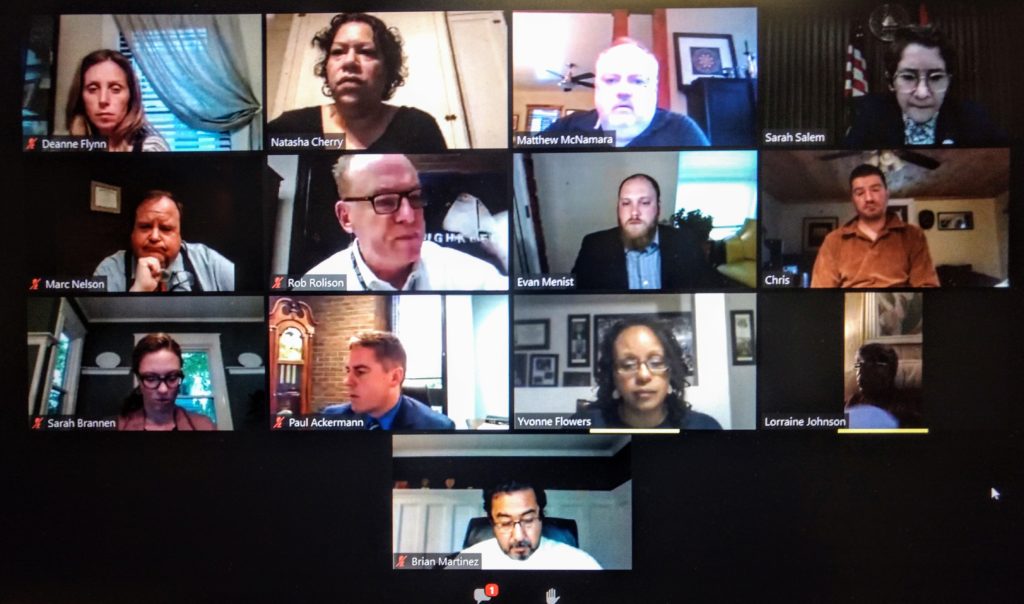POUGHKEEPSIE – Expecting a budget shortfall of more than $5 million as a result of the COVID-19 pandemic, Poughkeepsie Mayor Rob Rolison directed that all city departments except police, fire, and section 8 outline a plan to cut 15 percent from their respective departments by April 3 to soften the financial crisis. All required departments except the city’s common council complied.
Rolison’s office complied with the directive, leaving the council alone in their defiance. Rolison cut the position of his administrative assistant, known as “the face of the office,” staffed by Kathleen Vacca. She was reassigned to a vacant position in the building department on the second floor, leaving Rolison to essentially work as both assistant and mayor. A grant, set to expire at the end of the summer, has partially filled the void created with Vacca’s transfer. Rolison now has a college intern through the end of the summer to assist in the day-to-day operations of the city’s top post.
In an early heated debate at Monday’s four-hour marathon council meeting, Councilman Matt McNamara questioned the council’s disregard for requested budget cuts as his colleague, Evan Menist, 2nd Ward representative, gave the council’s finance committee report on behalf of committee chairman Chris Petsas.
Menist, in his report, said that the committee “did a deep dive” when assessing the proposed cuts submitted by other departments. The cuts, calculated by the city’s Commissioner of Finance, Brian Martinez and Administrator Nelson identified savings of approximately $1.5 million. McNamara was visibly agitated during the Menist response on the video meeting and vowed to continue his questioning when the actual resolution came up.
Almost two hours into the meeting, the resolution calling for the cuts came up with lawmakers Petsas and Flowers offering their support, with Flowers saying “We should move forward with Phase 1” prompting McNamara to ask Council Chairperson Sarah Salem about the legislative body’s potential cuts.
Salem indicated that the council is still considering cuts and the reductions should be ready in time for Phase 2. Salem argued that Rolison’s cuts did not include the council, contrary to Nelson’s memo. Menist aided Salem with the claim that “members of the council are not employees,” and argued that there was no directive to the council to make budget cuts.
Council members are considered employees who currently get a salary of $15,000 annually with Salem getting $22,500 as chairperson, all paid for by city tax dollars. McNamara, visibly frustrated, offered an amendment to the proposal asking his colleagues to agree to cut their designated ward spending by 15 percent. Petsas and Menist shot down the proposal using technicalities.
Rolison was irritated by the council’s inability to address their own spending while slashing funds in all other required departments. “It’s unconscionable,” said Rolison. “I cut my budget and my dedicated employee ended up in another position to save taxpayer dollars and the council kicked the can down the road with regard to their own budget. Dedicated city employees in the police and fire departments risk their lives on a daily basis and were exempt from cuts because of their work – the council isn’t in the same category,” he added.
After the meeting in which the council passed the first round of cuts, Salem, department head for the council, denied the comparison of the council to the city’s exempt first responders “We will be making cuts to our budget and those cuts will be voted on in phase 2. I have been engaged in discussions of how we will cut our budget alongside my colleagues and we will engage in further discussion with proposed cuts ready for inclusion in phase 2. Phase 1 was prepared by the administration and presented to our finance committee first-round cuts.”
City Administrator Nelson noted that the city’s administration worked with department heads to identify potential savings and presented the numbers to the council’s finance committee for review.
“This was not an arbitrary list of unfortunate and unplanned cuts. The city’s administration worked diligently to minimize the impact on the workforce and the taxpayers and presented the findings to the council for their consideration,” said Rolison, stressing that the council had the opportunity to change the proposal, including tightening their own collective belt, especially given the circumstances.”








